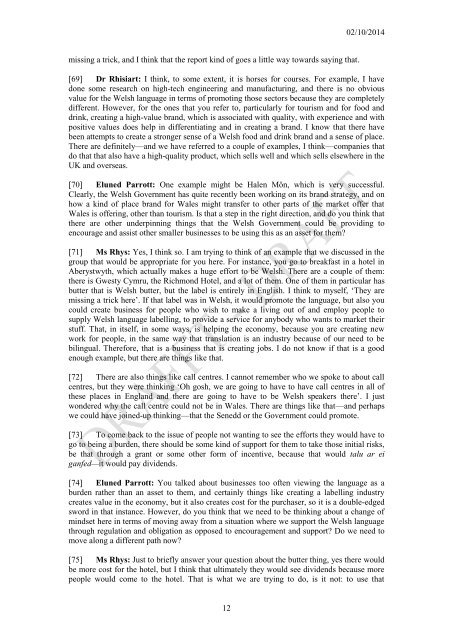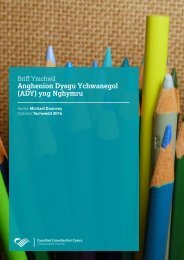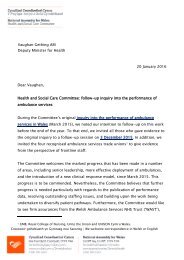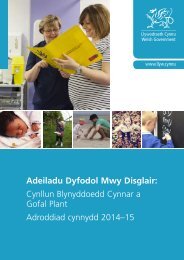You also want an ePaper? Increase the reach of your titles
YUMPU automatically turns print PDFs into web optimized ePapers that Google loves.
02/10/<strong>2014</strong><br />
missing a trick, and I think that the report kind of goes a little way towards saying that.<br />
[69] Dr Rhisiart: I think, to some extent, it is horses for courses. For example, I have<br />
done some research on high-tech engineering and manufacturing, and there is no obvious<br />
value for the Welsh language in terms of promoting those sectors because they are completely<br />
different. However, for the ones that you refer to, particularly for tourism and for food and<br />
drink, creating a high-value brand, which is associated with quality, with experience and with<br />
positive values does help in differentiating and in creating a brand. I know that there have<br />
been attempts to create a stronger sense of a Welsh food and drink brand and a sense of place.<br />
There are definitely—and we have referred to a couple of examples, I think—companies that<br />
do that that also have a high-quality product, which sells well and which sells elsewhere in the<br />
UK and overseas.<br />
[70] Eluned Parrott: One example might be Halen Môn, which is very successful.<br />
Clearly, the Welsh Government has quite recently been working on its brand strategy, and on<br />
how a kind of place brand for Wales might transfer to other parts of the market offer that<br />
Wales is offering, other than tourism. Is that a step in the right direction, and do you think that<br />
there are other underpinning things that the Welsh Government could be providing to<br />
encourage and assist other smaller businesses to be using this as an asset for them?<br />
[71] Ms Rhys: Yes, I think so. I am trying to think of an example that we discussed in the<br />
group that would be appropriate for you here. For instance, you go to breakfast in a hotel in<br />
Aberystwyth, which actually makes a huge effort to be Welsh. There are a couple of them:<br />
there is Gwesty Cymru, the Richmond Hotel, and a lot of them. One of them in particular has<br />
butter that is Welsh butter, but the label is entirely in English. I think to myself, ‘They are<br />
missing a trick here’. If that label was in Welsh, it would promote the language, but also you<br />
could create business for people who wish to make a living out of and employ people to<br />
supply Welsh language labelling, to provide a service for anybody who wants to market their<br />
stuff. That, in itself, in some ways, is helping the economy, because you are creating new<br />
work for people, in the same way that translation is an industry because of our need to be<br />
bilingual. Therefore, that is a business that is creating jobs. I do not know if that is a good<br />
enough example, but there are things like that.<br />
[72] There are also things like call centres. I cannot remember who we spoke to about call<br />
centres, but they were thinking ‘Oh gosh, we are going to have to have call centres in all of<br />
these places in England and there are going to have to be Welsh speakers there’. I just<br />
wondered why the call centre could not be in Wales. There are things like that—and perhaps<br />
we could have joined-up thinking—that the Senedd or the Government could promote.<br />
[73] To come back to the issue of people not wanting to see the efforts they would have to<br />
go to being a burden, there should be some kind of support for them to take those initial risks,<br />
be that through a grant or some other form of incentive, because that would talu ar ei<br />
ganfed—it would pay dividends.<br />
[74] Eluned Parrott: You talked about businesses too often viewing the language as a<br />
burden rather than an asset to them, and certainly things like creating a labelling industry<br />
creates value in the economy, but it also creates cost for the purchaser, so it is a double-edged<br />
sword in that instance. However, do you think that we need to be thinking about a change of<br />
mindset here in terms of moving away from a situation where we support the Welsh language<br />
through regulation and obligation as opposed to encouragement and support? Do we need to<br />
move along a different path now?<br />
[75] Ms Rhys: Just to briefly answer your question about the butter thing, yes there would<br />
be more cost for the hotel, but I think that ultimately they would see dividends because more<br />
people would come to the hotel. That is what we are trying to do, is it not: to use that<br />
12








